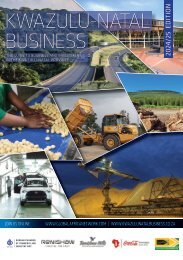Limpopo Business 2016-17 edition
The 2016/17 edition of Limpopo Business is the eighth issue of this highly successful publication that, since its launch in 2007, has established itself as the premier business and investment guide to the Limpopo province. Limpopo is unique in terms of its abundant natural and human resources, and is also one of the key drivers behind the South African economy. This edition of Limpopo Business is officially endorsed by the Office of the Premier of Limpopo.
The 2016/17 edition of Limpopo Business is the eighth issue of this highly successful publication that, since its launch in 2007, has established itself as the premier business and investment guide to the Limpopo province.
Limpopo is unique in terms of its abundant natural and human resources, and is also one of the key drivers behind the South African economy.
This edition of Limpopo Business is officially endorsed by the Office of the Premier of Limpopo.
You also want an ePaper? Increase the reach of your titles
YUMPU automatically turns print PDFs into web optimized ePapers that Google loves.
SPECIAL FEATURE<br />
South Africa’s mangoes and tomatoes; papayas (65%);<br />
tea (36%); citrus, bananas and litchis (25%) and 60% of<br />
the country’s avocadoes.<br />
The best-performing subsector of South African<br />
exports over the last five years is fruit and nuts according<br />
to worldstopexports.com. In 2015 South African<br />
exports of these items were valued at $2.9-billion,<br />
3.6% of the country’s total. This represents a 27%<br />
increase since 2011, and here <strong>Limpopo</strong> has a great record:<br />
avocadoes, mangoes and macadamia nuts from<br />
the province’s eastern regions are hugely popular<br />
in international markets and <strong>Limpopo</strong>’s commercial<br />
farmers are extremely efficient.<br />
<strong>Limpopo</strong> is also a water-scarce province, however,<br />
and there are many subsistence farmers in the<br />
province. Under the system of apartheid, so-called<br />
homelands were created and three of these were located<br />
within the boundaries of what is today <strong>Limpopo</strong><br />
Province: the legacy of poverty that was part of the<br />
homeland plan still exists. The Premier of <strong>Limpopo</strong>,<br />
Chupu Stanley Mathabatha, referred directly to one of<br />
the indicators of poverty in his State of the Nation address<br />
in 2015: “We have also reduced the dependency<br />
index from eight in 2006 to six in 2014. This means<br />
that in our province, for every one person employed,<br />
there are, on average, six people who depend on the<br />
income of that person.”<br />
While welcoming the improvement, the Premier<br />
pledged to work to reduce it still further.<br />
Mining is the other big sector – with agriculture<br />
– in <strong>Limpopo</strong>. <strong>Limpopo</strong> has huge reserves of coal,<br />
platinum, chromium, uranium clay, nickel, cobalt,<br />
vanadium, limestone and tin.<br />
Within <strong>Limpopo</strong>, approximately 400 prospecting<br />
and mining licences have been granted for a wide<br />
range of minerals. These include the largest diamond<br />
mine in South Africa, the biggest copper mine in<br />
South Africa, the biggest open-pit platinum mine<br />
in the country and the biggest vermiculite mine in<br />
the world. The province has 41% of South Africa’s<br />
platinum group metals (PGMs), 90% of South Africa’s<br />
red-granite resources and approximately 50% of the<br />
country’s coal reserves. Antimony, a highly strategic<br />
mineral found in large quantities in China, is another<br />
of <strong>Limpopo</strong>’s major assets.<br />
The provincial government of <strong>Limpopo</strong> is determined<br />
to leverage the mineral sector to create more<br />
industry in the province. To this end, five interventions<br />
are planned for the medium- and long-term:<br />
• A provincial supplier development programme<br />
• A mining community development programme<br />
• A post-mining-era skills development programme<br />
• A provincial industrialisation programme<br />
• A procurement programme that ensures that<br />
mines buy 20% of their supplies from local small,<br />
medium and micro enterprises (SMMEs) and<br />
co-operatives<br />
Another aim is to develop the manufacturing capacity<br />
of the province. The goal is to create value within<br />
the borders of <strong>Limpopo</strong>, and in this way to create<br />
employment. Manufacturing in the province is centred<br />
around mining areas (smelters and refineries),<br />
agricultural estates (juices and concentrates) and in<br />
Polokwane it is strong on food and beverages).<br />
Agri-processing is strong, with Pioneer Foods,<br />
McCain, Granor Passi, Kanhym, Westfalia and<br />
Enterprise Foods prominent, but this sector still has<br />
enormous potential to grow.<br />
Strategic location<br />
The Great North Road passes through <strong>Limpopo</strong><br />
from the south to the border town of Musina and<br />
on to Zimbabwe and its neighbours in the Southern<br />
African Development Community. The province’s<br />
location lends itself to logistical operations and<br />
most of South Africa’s operators have a presence<br />
in the provincial capital city of Polokwane. Freight<br />
logistics hubs have been established at Polokwane<br />
and Musina.<br />
Large national logistics company Value Group has<br />
only four major regional depots outside Gauteng:<br />
the fact that one of these is in Polokwane shows<br />
the importance of <strong>Limpopo</strong> in the logistics chain in<br />
South Africa.<br />
Logistics giant Imperial Logistics Southern Africa<br />
has 70 companies in its group structure, including<br />
Kobus Minaar Transport, a concern that began in<br />
Tzaneen transporting fruit and vegetables. Much of<br />
the agricultural produce of the province has to be<br />
delivered to ports in a hurry because of the delicate<br />
nature of the fruit. Avocadoes are particularly easy to<br />
bruise and so companies such as Freezerlines, Fast ‘n<br />
LIMPOPO BUSINESS <strong>2016</strong>/<strong>17</strong><br />
16


















